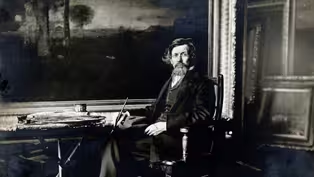State of the Arts
The Chivalrous Crickets
Clip: Season 41 Episode 5 | 7m 9sVideo has Closed Captions
The Princeton-based Chivalrous Crickets blend Celtic, English, and American folk music
The Chivalrous Crickets bring together Celtic, English, and American folk music. State of the Arts catches them in rehearsal at their home-base in Princeton Junction. The group, made up of family and long-time friends, is also seen in performance at the Museum of the American Revolution in Philadelphia, where they perform an all-Scottish program.
Problems playing video? | Closed Captioning Feedback
Problems playing video? | Closed Captioning Feedback
State of the Arts is a local public television program presented by NJ PBS
State of the Arts
The Chivalrous Crickets
Clip: Season 41 Episode 5 | 7m 9sVideo has Closed Captions
The Chivalrous Crickets bring together Celtic, English, and American folk music. State of the Arts catches them in rehearsal at their home-base in Princeton Junction. The group, made up of family and long-time friends, is also seen in performance at the Museum of the American Revolution in Philadelphia, where they perform an all-Scottish program.
Problems playing video? | Closed Captioning Feedback
How to Watch State of the Arts
State of the Arts is available to stream on pbs.org and the free PBS App, available on iPhone, Apple TV, Android TV, Android smartphones, Amazon Fire TV, Amazon Fire Tablet, Roku, Samsung Smart TV, and Vizio.
Providing Support for PBS.org
Learn Moreabout PBS online sponsorshipThe Chivalrous Crickets: [ Singing ] Heave her ho, boys.
Let her go, boys.
Sailing homeward.
To Mingulay.
Heave her ho, boys.
Let her go, boys.
Swing her head round.
Into the weather.
Man: Please give a warm welcome to The Chivalrous Crickets.
[ Cheering and applause ] Narrator: Up-and-coming Celtic band The Chivalrous Crickets performed an all-Scottish program at the Museum of the American Revolution in Philadelphia.
[ Bagpipers playing "The Minstrel Boy" ] The Philadelphia St. Andrew's Society owns a sword, on loan to the museum, that once belonged to General Hugh Mercer.
Gillespie: Hugh Mercer, after needing to escape Scotland, sailed over here to America.
He befriended George Washington and he ended up fighting in the revolution here.
He fought in the Battle of Princeton, which is actually where he died, and Mercer County is named after him.
My family's Scottish and, when we were younger, they wanted to put us into Highland dancing, but there wasn't a place at that time a studio to learn that anywhere near us, so, we got involved in Irish step dancing, instead.
Genevieve: I grew up in a family of musicians.
My parents played musicians professionally.
My mum owns a violin studio and teaches at the collegiate level, And so my two sisters and I were sort of born with instruments in our hands.
We're all trained classically.
But she, my mother, had already gotten very involved in Irish music, so, then we all got very involved in Irish music.
[ Playing jaunty tune ] It's a band of husbands and wives and sisters and best friends and old friends and -- Gillespie: Genevieve, the fiddler, is my sister; and Bradley, our bass and cello player, is her husband.
Paul, who is our many plucked instrument player, is my partner.
And Ben Matus is one of our oldest friends since college age.
And then Benya Stewart in the band is born and raised in Appalachia, so, he brings to us, probably, the most pure American tradition.
One of the key elements of the sound of The Chivalrous Crickets is that there are sister voices in it.
There are some times when Fiona and I will listen back to a recording and, if we didn't know our parts, we wouldn't know which one was singing which.
I even have trouble identifying whose voice is whose.
-[ Singing ] Weary spell she's laid on her.
She'd be with child for long and many's the year.
But the child she would never bear.
And in her bower.
Genevieve: Many of the members of the band are early musicians and what that really means is they play music that was written before 1800.
They are trained to do that.
[ Playing mellow tune ] Gillespie: [ Singing ] Cold, cold December.
When the wind blows to bring the bodies near.
Narrator: The name The Chivalrous Crickets is derived from the medieval bestiary, a catalog of animals in which the cricket is described as a small, jolly animal who sings, forgetting all else.
Genevieve: [ Singing ] So much.
I love you so much.
[ Speaking] And that was really -- that resonated with us because, in our lives, no matter the responsibilities we've had, or the challenges or the pressures on us, we're always just, you know, in our family, bursting into some song and, ultimately, we're always just going to be making music whenever we can.
[ Singing ] So close to me.
All night.
Bradley: [ Singing ] Do do do do.
Genevieve: [ Speaking ] The other tradition that we bring into the group is Appalachian and old time music.
Stewart: American folk music, you can almost think of it as like the Mississippi River, that it has all these tributaries from various other traditions.
Genevieve: [ Singing ] Stewart: One huge branch of it is from the Scots Irish people who settled in the mountains.
But another, massive, part of American folk music that you cannot ignore is the music that was brought by people who were enslaved here.
And the banjo is an African instrument, but the Celtic music blended with this African music and, ultimately, random groups of other people who were coming through and then these tunes just kind of stuck in these little communities.
I think there is a balance to be struck between preserving something that has come down to us.
We're artists, we're creative types, and I think every artist, every singer, puts their own little spin and their own little flare.
[ Playing tranquil tune ] Genevieve: [ Singing ] Narrator: The Chivalrous Crickets practice in the Princeton Junction home of members Genevieve and Bradley King.
They've performed at the nearby West Windsor Arts Center and in Princeton's Herronton Woods.
Bradley, once the lead singer for the Philadelphia Boys Choir, directs the community choir at the historic Dutch Neck Presbyterian Church.
Choir: [ Singing ] Genevieve: [ Singing ] [ Resumes singing ] Gillespie: An overriding trend in this band, for whatever reason, is, instead of writing songs that come from a personal place, the majority of us write songs that are influenced by anecdotes, stories, pieces of history.
Genevieve: She wrote a song about Joan of Arc because that's a wild story.
We're all used to kind of the story of that, but when you really look into it, you're like, "Wait, what?
This was crazy!
And true!"
Gillespie: We all know she was burned at the stake.
I don't know if people know much past that.
She was only 14 when that happened.
She was quite religious growing up, I mean, from a very young age, and she claimed to have all of these visions.
And, at a certain point, she became obsessed with getting an audience with the king of France, to let him know that she had heard a message from God that told her how to defeat the English in the Hundred Years War that was going on at the time.
And she marched with him at the head of the French Army for close to a year and, during that time, they actually did experience enormous success.
They won most of their battles.
Until she was captured by the English.
And what's really sad is that, when that happened, the French made no effort to ransom her back.
The Chivalrous Crickets: [ Singing ] There'll be no help if not from me.
Across the fields of Burgundy, the voices.
Bradley: Making music, the creation of music, writing a song, it's essentially magic.
People talk about music as being the only true universal language.
And that's really true.
We all can do it and we all can do it together, no matter where we come from.
The Chivalrous Crickets: [ Singing outro ]
Video has Closed Captions
Clip: S41 Ep5 | 8m 47s | Ecuadorian artist Layqa Njna Yawar creates a mural at Newark Airport (8m 47s)
The Montclair Art Museum's George Inness Gallery
Video has Closed Captions
Clip: S41 Ep5 | 6m 45s | The unique, chapel-like George Inness Gallery at the Montclair Art Museum (6m 45s)
Providing Support for PBS.org
Learn Moreabout PBS online sponsorship

- Arts and Music
The Best of the Joy of Painting with Bob Ross
A pop icon, Bob Ross offers soothing words of wisdom as he paints captivating landscapes.












Support for PBS provided by:
State of the Arts is a local public television program presented by NJ PBS


